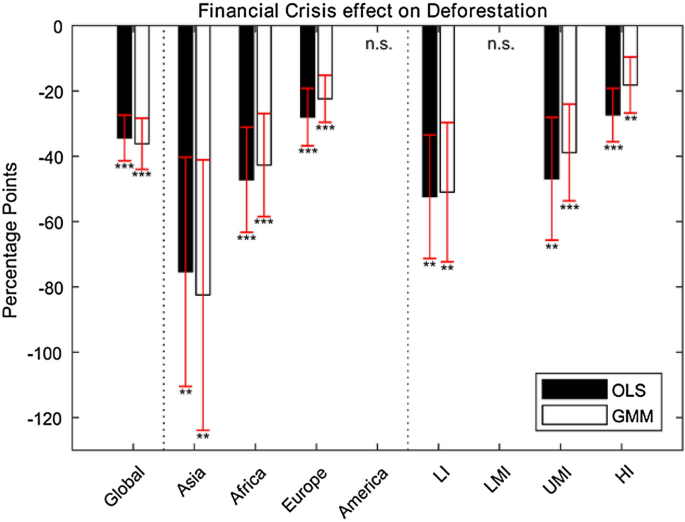2022-03-22 サセックス大学
サステナビリティ・サイエンス誌に掲載された論文において、21世紀における100期以上の金融危機の間に150カ国から得たデータを分析し、森林破壊に対する金融危機の影響を調査し、木材、牛、カカオの生産など、森林破壊の主要な推進要因も、金融危機の期間中に減少することがわかった。
<関連情報>
- https://www.sussex.ac.uk/research/full-news-list?id=57668
- https://link.springer.com/article/10.1007/s11625-021-01086-8
金融危機が森林破壊に与える影響:世界および地域別パネルデータ分析 The effect of financial crises on deforestation: a global and regional panel data analysis
Alexander S. Antonarakis,Lucia Pacca &Andreas Antoniade
Published: 29 January 2022

Abstract
Managing our transition to sustainability requires a solid understanding of how conditions of financial crisis affect our natural environment. Yet, there has been little focus on the nature of the relationship between financial crises and environmental sustainability, especially in relation to forests and deforestation. This study addressed this gap by providing novel evidence on the impact of financial crises on deforestation. A panel data approach is used looking at Global Forest Watch deforestation data from > 150 countries in > 100 crises in the twenty-first century. This includes an analysis of crises effects on principle drivers of deforestation; timber and agricultural commodities—palm oil, soybean, coffee, cattle, and cocoa. At a global level, financial crises are associated with a reduction in deforestation rates (− 36 p.p) and deforestation drivers; roundwood (− 6.7 p.p.), cattle (− 2.3 p.p.) and cocoa production (− 8.3 p.p.). Regionally, deforestation rates in Asia, Africa, and Europe decreased by − 83, − 43, and 22 p.p, respectively. Drivers behind these effects may be different, from palm oil (− 1.3 p.p.) and cocoa (− 10.5 p.p.) reductions in Africa, to a combination of timber (− 9.5 p.p) and palm oil in Asia. Moreover, financial crises have a larger effect on deforestation in low-income, than upper middle- and high-income countries (− 51 vs − 39 and − 18 p.p. respectively). Using another main dataset on yearly forest cover—the ESA-Climate Change Initiative—a picture arises showing financial crises leading to small global decreases in forest cover (− 0.1 p.p.) with a small agricultural cover increase (0.1 p.p). Our findings point to financial crises as important moments for global deforestation dynamics. Yet, to consolidate benefits on decreasing deforestation, governments need to enhance their sustainable forest management during crisis periods rather than let it slip down national agendas. Finally, to achieve the SDGs related to forests, better global forest cover datasets are needed, with better forest loss/gain data, disturbance history, and understanding of mosaicked landscape dynamics within a satellite pixel.


